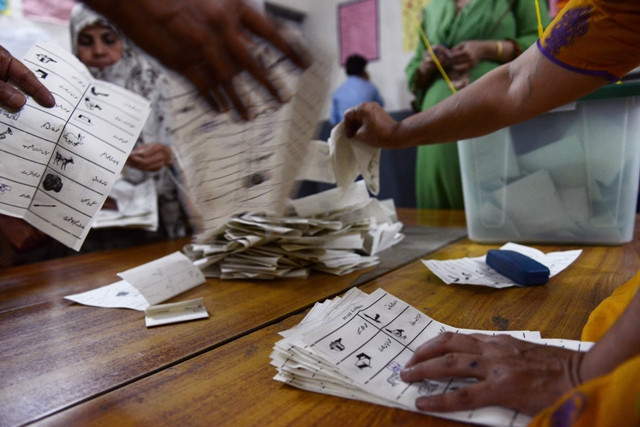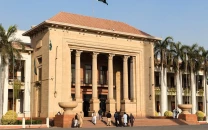2013 polls: ECP meeting adds confusion to election row
Officials say private experts were hired for serial numbering of ballot papers.

2013 polls: ECP meeting adds confusion to election row
While doubts are being cast on the credibility of the 2013 general elections by some political parties, officials of the Election Commission of Pakistan (ECP) added to the confusion during a news conference on Friday.
After a meeting of the commission with different departments which had worked with the ECP for conducting the elections, an ECP official revealed that the organisations entrusted with printing ballot papers had hired 34 people from Lahore markets for ‘manual numbering’ on the ballots.
Since the government printing presses use old machines, the Printing Corporation of Pakistan and Pakistan Security Printing Corporation, had to mark serial numbers on the printed ballot papers manually, Malik Masood, the director general (Elections) at ECP, told reporters. Due to shortage of staff and scarcity of time, the ECP provincial office requested the caretaker Punjab government to arrange workers from the market for the purpose.
At the news conference, Malik Masood was flanked by the commission’s Director General (Media) Iftikhar Raja, Director (Law) Sheikh Muhammad Nawaz and Director (IT) Khyzir Aziz. Acting Chief Election Commissioner Justice Anwar Zaheer Jamali, who is a serving judge of the Supreme Court, presided over the meeting.

Masood revealed that in all 34 printing experts had been hired, mainly from Urdu Bazaar and Lakshmi Chowk, Lahore, for this purpose. These people had worked strictly under the discipline of the government bodies while Pakistan Army was providing security, he added.
He said the PTI chairman’s allegations that the ballot papers were printed in Lahore’s private printing presses were baseless. However, the disclosure of hiring private individuals from market for such a sensitive job might provide impetus to criticism of the electoral process. In the numbering order, same serial number is marked on a ballot paper and its counterfoil.
The meeting was convened to analyse the allegations and prepare a fact sheet. The ECP was asked by the parliamentary committee on electoral reforms to submit a detailed reply on the rigging allegations in its next meeting scheduled for September 29.
The meeting came days after the ECP published a post-elections review report on its website. The damning report pointed out shortcomings in the elections and sparked a new controversy. Surprisingly, however, the commission later disowned the contents of the report.
Thumb impressions
According to Masood, marking thumbprints with magnetic ink was an initiative of the commission. “Under law only CNIC was mandatory [to verify identity of the voter]. Steps like electoral rolls with picture of the voter and thumb impressions were additional steps taken on the direction of the Supreme Court,” he added.
In most of the cases, the ECP officials said, NADRA’s database cannot read the fingerprints since ridges on thumbs of most of the people who do manual labour fade away.
The ECP officials could not satisfy queries regarding legality of the fingerprints verification if it is not covered under the law. They also failed to give a satisfactory answer to questions regarding Rs100 million spent on a magnetic ink project when there were possibilities that a large number of fingerprints would not be readable.
Masood said the ECP would inquire into the issue – but he wouldn’t say when the inquiry will start.
Result Management System
Director (IT) Khizar Hayat told the news conference that the ECP followed a computerised result management system and no manual results were prepared. Forms 16 and 17 had been received from the returning officers through the system and the computerised record was available with the commission. He refuted a claim in the post-election review report that the computerised system had collapsed on the election day.
Asked why Forms 14 and 15, which are prepared by the presiding officers at every polling station, were not put on the ECP website so that everyone could compare the consolidated results prepared by the returning officers in Forms 16 and 17, Hayat said it was not needed under the law.
Published in The Express Tribune, September 27th, 2014.



















COMMENTS
Comments are moderated and generally will be posted if they are on-topic and not abusive.
For more information, please see our Comments FAQ